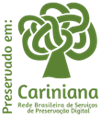Desinformación y los cursos de biblioteca de las universidades públicas del Estado de São Paulo: un análisis de los proyectos pedagógicos y la opinión de los profesores
DOI:
https://doi.org/10.62758/re.v2i3.170Palabras clave:
Desinformación, Reanudar, Noticias FalsasResumen
Con el avance de la tecnología y el uso de las redes sociales, se ha intensificado la difusión de desinformación y fake news. Estos temas han recibido una atención creciente en el debate público democrático. La discusión sobre estos temas en el campo académico, especialmente en relación a la formación de bibliotecarios, responsables de la mediación de la información, se vuelve fundamental para comprender si los futuros profesionales están capacitados para trabajar con la desinformación en su desempeño profesional. Por lo tanto, este artículo tiene el objetivo general de averiguar si y cómo las universidades públicas del Estado de São Paulo que ofrecen el curso de Biblioteconomía abordan cuestiones relacionadas con la desinformación. Para lograr los objetivos se realizó una investigación cualitativa-cuantitativa, basada en una revisión bibliográfica sobre los conceptos “desinformación” y “fake news”, posteriormente se elaboró un cuestionario mixto y se envió al cuerpo docente de las universidades. Para analizar los resultados obtenidos se utilizó la metodología del Discurso del Sujeto Colectivo. La revisión bibliográfica combinada con el cuestionario nos permitió comprender si y cómo los cursos de Biblioteconomía en las instituciones elegidas abordan los temas mencionados. Se constató que entre las universidades del Estado de São Paulo, no hay oferta de una disciplina cuyo objetivo sea abordar la desinformación y las fake news, a pesar de ello, existe un abordaje y debate en el aula en otras disciplinas del curso. Por lo tanto, se observa que los docentes cuentan con formación continua y tienen conocimiento sobre la desinformación y fake news, tanto en términos de identificación como de estrategias de afrontamiento. A pesar de eso, estas universidades necesitan actualizarse para incluir en su currículo disciplinas que sean capaces de responder a las demandas emergentes de la sociedad y la profesión.
Citas
Allcott, H. & Gentzkow, M. (2017). Social media and fake news in the 2016 election. Journal of economic perspectives, 31(2), 211-36. DOI: https://doi.org/10.1257/jep.31.2.211
BRASIL. Senado Federal (1962). Lei 4.084/62. Dispõe sobre a profissão de bibliotecário e regula seu exercício. Brasília, DF, Senado Federal. Recuperado de http://www.planalto.gov.br/ccivil_03/leis/1950-1969/l4084.htm.
BRASIL. Senado Federal (2010). Lei 12.244/10. Dispõe sobre a universalização das bibliotecas nas instituições de ensino do País. Brasília, DF, Senado Federal. Recuperado de https://www.planalto.gov.br/ccivil_03/_Ato2007-2010/2010/Lei/L12244.htm.
BRASIL. Senado Federal (2020). Projeto de Lei 4401/20. Dispõe sobre os requisitos mínimos para as bibliotecas escolares e amplia o prazo de universalização para 2022. Brasília, DF, Senado Federal. Recuperado de https://www.camara.leg.br/proposicoesWeb/fichadetramitacao?idProposicao=2261203.
Brisola, A. & Bezerra, A. C. (2018). Desinformação e circulação de “fake news”: distinções, diagnóstico e reação. In XIX Encontro Nacional de Pesquisa em Ciencia da Informação (XIX ENANCIB). Londrina: UEL. Recuperado de https://brapci.inf.br/index.php/res/download/124659.
Capurro, R. & Hjorland, B. (2007). O conceito de informação. Perspectivas em ciência da informação, 12, 148-207. DOI: https://doi.org/10.1590/S1413-99362007000100012
Hubner, M. L. F., Silva, J. F. M. & Atti, A. (2021). Origens do Ensino De Biblioteconomia No Brasil. BIBLOS, 35(1). DOI: https://doi.org/10.14295/biblos.v35i1.12105
Merriam-Webster (s.d.). Disinformation. In Merriam-Webster.com dictionary. Retrieved October 21, 2022. https://www.merriam-webster.com/dictionary/disinformation.
Mueller, S. P. M. (1985). O ensino de biblioteconomia no Brasil. Ciência da Informação, 14(1).
Pinheiro, M. M. K. & Brito, V. D. P. (2014). Em busca do significado da desinformação. Data Grama Zero, João Pessoa, 15(6).
Posetti, J. & Matthews, A. (2018). A short guide to the history of ‘fake news’ and disinformation. International Center for Journalists, 7(2018), 2018-07. Recuperado de https://www.icfj.org/sites/default/files/2018-07/A%20Short%20Guide%20to%20History%20of%20Fake%20News%20and%20Disinformation_ICFJ%20Final.pdf
Padilha Neto, J. D. (2020). A gestão na composição curricular dos cursos de graduação em Biblioteconomia no Brasil: a contribuição do diálogo interdisciplinar entre a Ciência da Informação e a Ciência da Administração.
Santos R. R. (2018). Fake news como produto da pós-verdade. Recuperado de https://www.observatoriodaimprensa.com.br/comunicacao-social/fake-news-como-produto-da-pos-verdade/.
Universidade de São Paulo (2021). Projeto Pedagógico do Curso de Biblioteconomia e Ciência da Informação. São Paulo: A Universidade. Recuperado de https://www.eca.usp.br/sites/default/files/inline-files/ppp-cbd-2020.pdf.
Universidade Estadual Paulista (2021). Projeto Político Pedagógico do Curso de Biblioteconomia. Marília: A Universidade. Recuperado de https://www.marilia.unesp.br/Home/Graduacao/Biblioteconomia/ppp-2021-sem-extensao.pdf.
Universidade Federal de São Carlos (2013). Projeto Político Pedagógico do Curso de Biblioteconomia e Ciência da Informação. São Carlos: A Universidade. Recuperado de https://www.dci.ufscar.br/arquivos/bci/projeto-pedagogico-bci.pdf.
Wardle, C. & Derakhshan, H. (2017). Information disorder: Toward an interdisciplinary framework for research and policymaking.
Descargas
Publicado
Cómo citar
Número
Sección
Licencia
Derechos de autor 2022 Revista EDICIC

Esta obra está bajo una licencia internacional Creative Commons Atribución 4.0.
La Asociación posee los derechos de autor de los textos que publica y adopta la licencia Creative Commons, CC BY 4.0 DEED Atribución 4.0 Internacional (https://creativecommons.org/
Usted es libre de:
- Compartir: copiar y redistribuir el material en cualquier medio o formato para cualquier propósito, incluso comercialmente.
- Adaptar: remezclar, transformar y construir a partir del material para cualquier propósito, incluso comercialmente.






